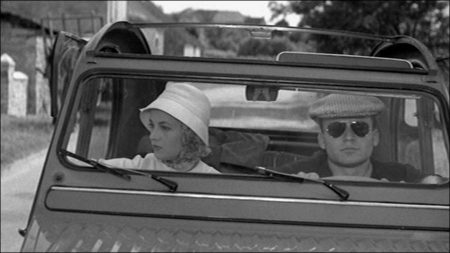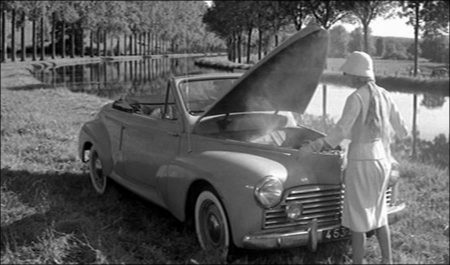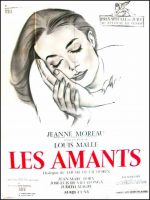Taglines: The most talked-about and fought-about film!
Les Amants movie storyline. The bored and empty upper-class Jeanne Tournier lives in a manor with many servants in the countryside of Dijon with her husband Henri Tournier and their daughter Catherine. Henri is the editor of The Burgundy Monitor and has been married to Jeanne for eight years, but he does pay attention to his wife. Jeanne travels frequently to the house of her childhood friend Maggy Thiebaut-Leroy in Paris to meet her lover, the famous polo player Raoul Flores.
One day, Henri suspects of the frequent trips of Jeanne to Paris and invites Maggy and Raoul Flores to have dinner and spend the weekend in his mansion. While driving back home from Paris, Jeanne car breaks down and the archaeologist Bernard Dubois-Lambert who is going to Montbard to visit a professor, gives a ride to Jeanne. Henri invites Bernard to stay with them.
Les Amants (English: The Lovers) is a 1958 French drama film directed by Louis Malle which stars Jeanne Moreau, Alain Cuny, and Jean-Marc Bory. Based on the novel Point de Lendemain by Dominique Vivant, the film concerns a woman involved in adultery who rediscovers human love. The Lovers was Malle’s second feature film, made when he was 25 years old.
The film was a box-office hit in France when released theatrically gaining 2,594,160 admissions in France alone. The film was highly controversial when released in the United States for its depiction of allegedly obscene material. At the 1958 Venice Film Festival, the film won the Special Jury Prize and was nominated for the Golden Lion.
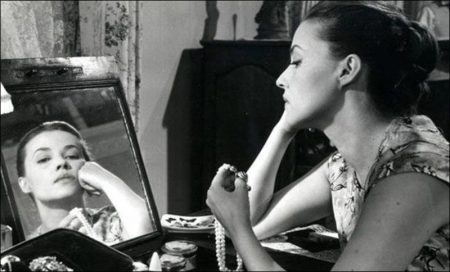
Film Review for Les Amants
Louis Malle cuts an ambiguous figure in film history. His stellar career launched itself in France in the 1950s, and yet there is dissension over whether he was truly part of the nouvelle vague or not. Young, talented and undeniably anti-establishment, there was and is much to recommend Malle to the ranks of the New Wave; but in Contemporary French Cinema Guy Austin calls him “a classical, rather than an experimental director” (1) and Remi Lanzoni argues that “[his] film performances were considered tangential and not seminal to the emerging trend” (2).
Despite the technical, narrative and thematic similarities between his work and that of the New Wave, the name Malle does not regularly feature besides Truffaut, Godard or Rivette. In this respect, Malle has missed out on some of the kudos regularly heaped on those groundbreakers, but he has also, at the same time, escaped the temporal lock-in they found themselves subjected to in later years.
Les Amants (The Lovers) was only Malle’s third feature film as a director, and his second work of fiction. Despite the critical acclaim of his sophomore effort, Ascenseur pour l’échafaud (Lift to the Scaffold, 1958), Les Amants was his real break-through. Tremendously popular both in France and overseas, the film established Malle as a serious continental talent, and Jeanne Moreau as the face of a new generation.
Based very loosely on a short story from the eighteenth century, Les Amants centres around Jeanne (Moreau), an unhappy upper-class wife. Married to a provincial newspaper owner (Alain Cuny), she regularly goes to Paris to meet her friend, Maggy (Judith Magre) and lover Raoul (José Luis de Villalonga). An unfortunate series of events leads to a weekend in the country for all four, with a passing stranger (Jean-Marc Bory) coming along for the ride. To Jeanne’s – and the audience’s – surprise she ends up spurning both husband and lover for the arms of the stranger, driving off with him to an uncertain future.
There is so much internal dissonance in Les Amants. Malle works with a very deceptive touch and the viewer is constantly plagued by the sense that there are other levels to the film, levels to which we have only sporadic access. On the one hand, the film is unremittingly bourgeois. Malle was just 26 when he made Les Amants, and much of his experience to this point mirrored that of Jeanne: a cocktail of provincial and Parisian life, with no lack of silver spoons in either. In between polo matches, soirees and salons, Malle stops just shy of putting a white telephone in the frame. This is a rich woman’s story, and as viewers we are torn between condemning Jeanne’s quest as upper-class ennui or reading it as some sort of parable.
Jeanne, beautiful, literally radiant on the screen, and always dressed in white, is clearly a princess, and the film’s use of a leitmotif by Brahms confirms it. This is a melodrama, Malle tells us; a heady, swooning tale of passions – and it is bourgeois, it has to be. Princesses may start out working-class, but you can’t disagree with a crown and a dress. Jeanne, virginal somehow, and white, leaps off the screen while visiting her husband’s printing press. She glides through the working-class like a swan over pond scum. The question is, where do we, the viewers, fit in? Are we a witness to Jeanne’s struggle to define herself, or are we part of this struggle?
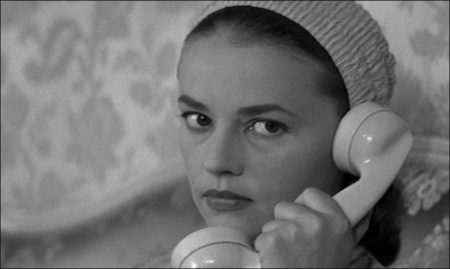
Malle is in no hurry to answer our questions. There is a sense that he is toying with the accoutrements of wealth; dangling narrative conventions in front of our eyes in order to wreak havoc through a devious parlour trick hidden behind them. Constantly, the film works to remind us that what we are seeing is a mask, an obfuscation. Mirrors are everywhere, and they remind us that, at heart, this is a story about self-identification.
People are constantly telling Jeanne what they see in her and we know that none of it is correct. Gazing into mirrors, Jeanne is desperately trying to find herself, or a version of herself that she is happy with. Instead, she sees an Other. There is a desperation in Jeanne. The desperation of Narcissus denied his reflection. But is this true? After all, everyone has the right to self-love, even the bourgeois, and Malle understands this. The film features strong conventions taken from bourgeois melodrama – the dashing, polo-playing lover, the dark and emotionally inaccessible husband, the discontented wife – but Malle continually undermines or questions them by giving his characters an unlooked-for humanity.
The dinner scene, with its unmistakable echoes of Renoir’s La Règle du jeu (The Rules of The Game, 1939), is a perfect example of this. The characters – all saddled with very archetypal roles – twist the scene into something unexpected. Raoul, speaking of his trip to Russia, says “It’s amazing, really, one steps across the frontier and one is at once in a foreign land”. This is a powerful statement that has a resonance across the whole film.
Malle is also constantly putting us in a familiar setting, taking a step to the side and asking us to reconsider what we are shown. For example, he holds shots when doors are closed, watches the silence instead of cutting away to another speech. It is at once real and highly imaginative; it is also deeply puzzling. We cannot help but empathise with Jeanne when we stare into something that should be so simple but defies our expectations and dissolves like smoke.
When passion, Eros, and love-at-first-sight strike in the final third of the film, this conundrum is brought into stark relief. Unlike the lovers, we cannot believe in the unabashed, optimistic Brahms on the soundtrack. Malle has shown us that it belongs to another story. Where are Jeanne and Bernard going? Where can they go? Their adventure, we feel, must end as surely as ours does, when the credits roll. When the sound of a cock crowing is heard in this final scene, last night’s dream should be dispelled. But no, it is still intact, though not without ambiguity. The one place the camera resolutely refuses to gaze is into the future. That, implies Malle, is for the viewer to see alone.
Les Amants (1958)
Directed by: Louis Malle
Starring: Jeanne Moreau, Jean-Marc Bory, Judith Magre, José Luis de Vilallonga, Gaston Modot, Michèle Girardon, Lucienne Hamon, Georgette Lobre, Claude Mansard, Alain Cuny
Screenplay by: Louise de Vilmorin
Production Design by: Bernard Evein
Cinematography by: Henri Decaë
Film Editing by: Léonide Azar
Set Decoration by: Jacques Saulnier
Makeup Department: Gisèle Jacquin
Music by: Alain Derosnay, Johannes Brahms
MPAA Rating: None.
Distributed by: Lux Compagnie Cinématographique de France (France), Zenith International Films (USA)
Release Date: September 30, 1958 (Venice), November 5, 1958 (France), October 26, 1959 (USA)
Views: 251
